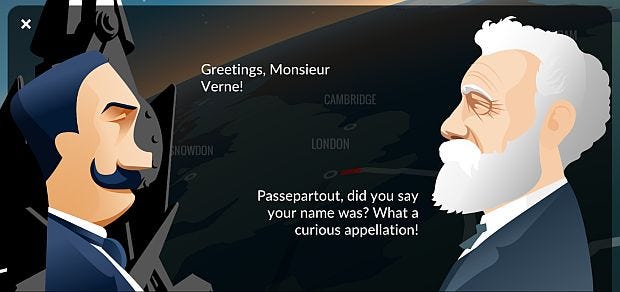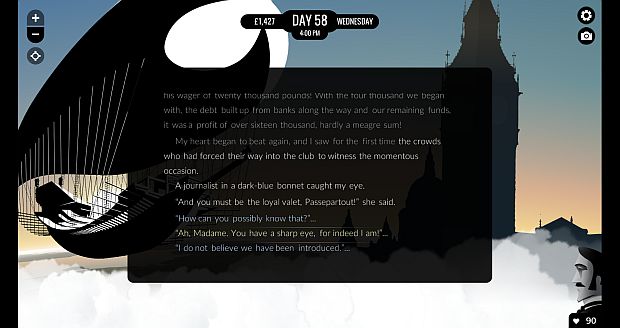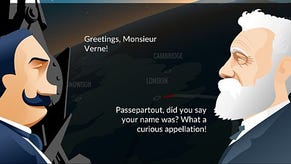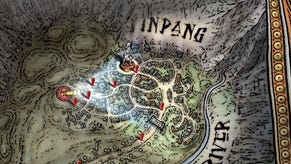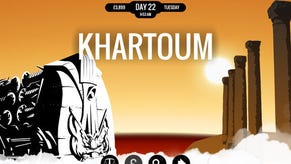Wot I Think: 80 Days
Around the world with kindness.
Videogames can take you on a thousand different adventures, but few offer the thrill of travel as 80 Days does. It's a story game adaptation of Around The World In 80 Days, and it's accordingly full of exciting, exotic locations to visit, with capers to pull, revolutions to incite and derring-do to perform at many of them. Yet it's in the quiet moments that it best captures the sensation of going on a journey. For me those moments were the mathematician I met, full of hope for the future of her home country, and the air pirate who kidnapped me in northern Europe but then entrusted me with delivering something personal to her. For you, they might be very different - but wherever you go, the appeal is the same. 80 Days is full of romance, and mystery, and intimacy, and a deep, abiding sense of melancholy, because it understands that what make journeys and adventures compelling isn't only the mutinies you lead, but the people you meet along the way. It is consequently the most human game I've ever played.
Here's Wot I Think.
80 Days [official site] casts you as Passepartout, faithful servant to stoic, reliable English gentleman Phileas Fogg. If you've never read the novel - or seen the cartoon where they're all talking cats - then the story begins with Fogg informing you that he's just made a wager that he can circumnavigate the globe in under 80 days. From that thin justification, Verne's original story sets off at pace for a whistlestop tour of a world which, at the time of its publication in 1873, was in the midst of multiple social and technological revolutions.
That time in which railways seemed to have suddenly shrunk the earth of course seems quaint in retrospect, so 80 Days makes some significant alterations to the story. In the main, this involves introducing science fiction to one of Verne's few stories not to already contain it, by making your modes of travel not just trains, boats and cars, but steampunk hovercraft, gyrocopters and airships, and by otherwise filling the distant cities you travel to with mechanical marvels. This infused the story with some of the same sense of grand invention that it might have had upon release, without undercutting its Victorian charms.
Better still, the game finds ways to infuse its encounters with a similar sense of social revolution. This is partly historical given that you visit cities in the midst of real civil wars, but it also quietly comes across through the dozens of capable women you encounter on your journey. It's not outwardly political, and in a better world it wouldn't be remarkable, but be they robot designers, chief engineers, mathematicians, ship captains or anything else, 80 Days feels refreshing for its treatment of both gender and sexuality.
Otherwise the story is mainly up to you, its structure shaped by the novel but its details shaped by the decisions you make about where to travel next. Heading east from London, you might decide to head down to Africa and across Asia, to steam across the Russian steppes, or to head due north to discover what mysteries await at the pole. You'll make your decisions, initially, according to two resources: the time each journey will take, and the cost. But as a choose-your-own adventure, I feel like the cleverness of 80 Days' mechanics is too easily overlooked.
As you explore the locations you visit and talk to people on each mode of transport, you'll discover new routes, which wind their way across the game's global map. These routes sometimes depart from your current location, but they're just as likely to be positioned on the other side of the planet. What these routes do however is plant seeds for where you might want to go next. A loose idea that you might head south suddenly hardens with the discovery of a route from South America to Dakar. The marketplaces you visit do something similar, by revealing that the bottle of wine you just bought for a few measly bucks in Paris will sell for $2300 in Moscow. These self-set objectives create tension as you try to fulfill them within the constraints of time and money, but they also lend a flighty sense of improvisation to the game as you're just as free - and likely - to drop them again as a new whim strikes. 80 Days whips adventures up via unexpected and dramatic events, but you'll also create it for yourself when you suddenly discover you're only a few hops away from Timbuktu and all other plans are abandoned.
Aside from money and time, your third resource is, most significantly, your relationship with Fogg. A small meter between 0 and 100 sits in the bottom right of the screen at all times and, as you travel in uncomfortable or perilous conditions, gradually ticks down. You can choose to ignore it, or you can re-fill it by seeing to Fogg's needs; forgoing a bout of exploration around your train carriage in favour of re-folding his clothes, giving him a clean shave, or playing a game with him. This might have been tedious, but each action is, like any in the game, performed near instantly with a single button press.
The result, for me, was a simulation of a relationship about tenderness. You are Fogg's servant, employed to look after him, but it feels like an act of deliberate kindness to choose to help him when he's feeling seasick rather than going off to flirt with yet more strangers. I can think of only a handful of games which have a relationship at their core, but I struggle to think of any which are as much about choosing to take care of someone. It's a structure that works well enough here that I'd play more games that mimicked it almost exactly. Perhaps an adaptation of The Thin Man in which you play Nora Charles, her husband Nick's face squashed in the corner becoming visibly more drunk with each crime solved.
In general 80 Days has a somewhat unusual treatment of choice, since the decisions you make during each vignette of story don't fall at regular intervals. Sometimes you are choosing what action to take; sometimes you are choosing how to respond to someone else's action; sometimes you are choosing the outcome of your own action. You're playing the part of Passepartout in partnership with the game, but it's clear that this is not a game about winning, even though the target score is in the title.
For all the grand, old-fashioned adventuring, it was the decisions about how to feel or what to say in response to events that I enjoyed most. Whether to be flustered in the face of adversity, or to be stoic. Whether to be judgemental of a newly encountered culture, or whether to be open to it. Whether to grumble and cast blame, or whether to be a comfort to others in times of hardship. True to its time period, 80 Days concerns itself with manners. This is often for comedy's sake, but just as often felt to me like a kind of power fantasy. I had the power to be unflappable, to be good.
All of this works as well as it does, of course, because of the writing. The script is evocative without being flowery, and it's wonderful at conjuring an atmosphere and depicting character through just a few sentences of description and dialogue.
She looked at my eyes for a moment, then smiled quickly. Taking my hand, she walked along the edge of the rail, the wind tugging her hair into a wild dance. The train's lamp was a single candle in an endless night. Lifting my hand past her cheek, she pointed my finger out into the desert. "There."
I saw nothing except evening stars...
I keep talking about humanity and kindness and romance and words, because those are among the things that make 80 Days remarkable, but I don't want to make the game sound like something worthy. It's also tremendous fun. Its brevity means that it's a pacey game to play. You will always be reading, but there are no great walls of text. It's high-spirited, good humoured and and full of fast-made friends, as any adventure story should be, and it regularly dances between half a dozen tones and genres without ever feeling incongruous. It's easy to complete the game once through in a single sitting should you wish, but you can play it multiple times without repeating an experience, and its episodic structure means you can visit a few locations before bed and find a natural resting point as you board a rickety machine towards the next continent. Whatever way you choose to consume it, your time will be rewarded.
80 Days is the most human game I've ever played. It is also, simply put, one of the best games I've ever played.
80 Days is out now on Steam, GOG and Humble.
